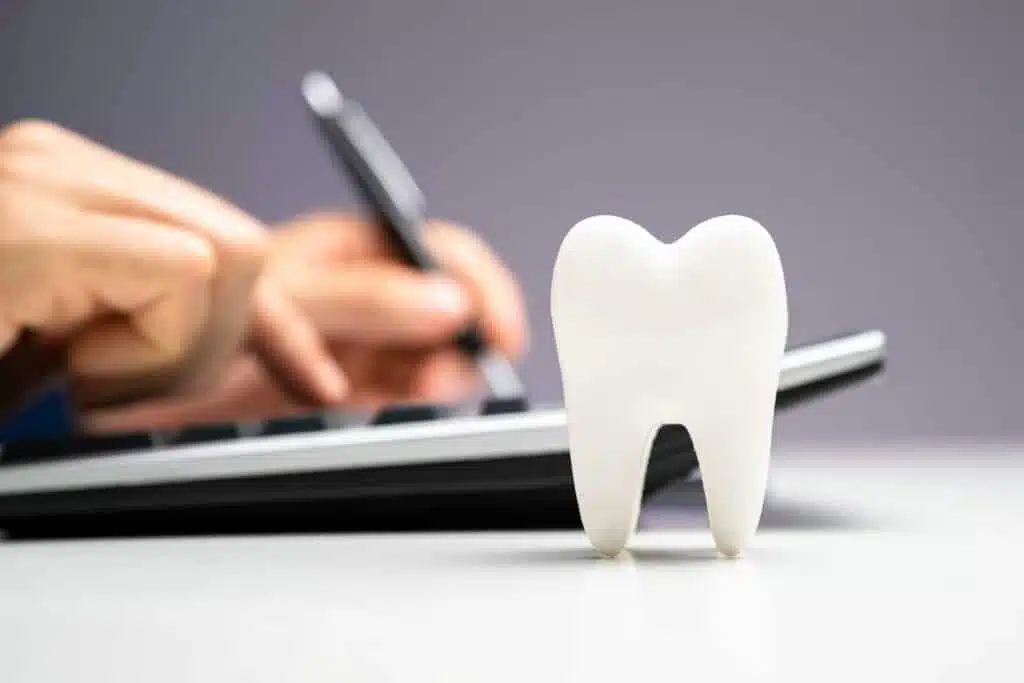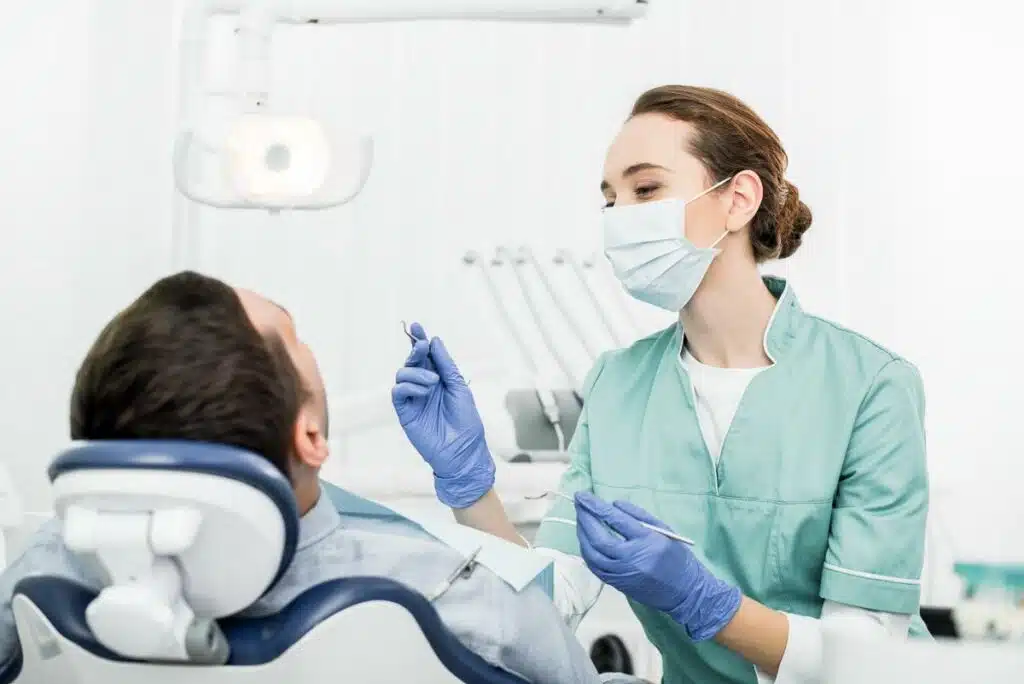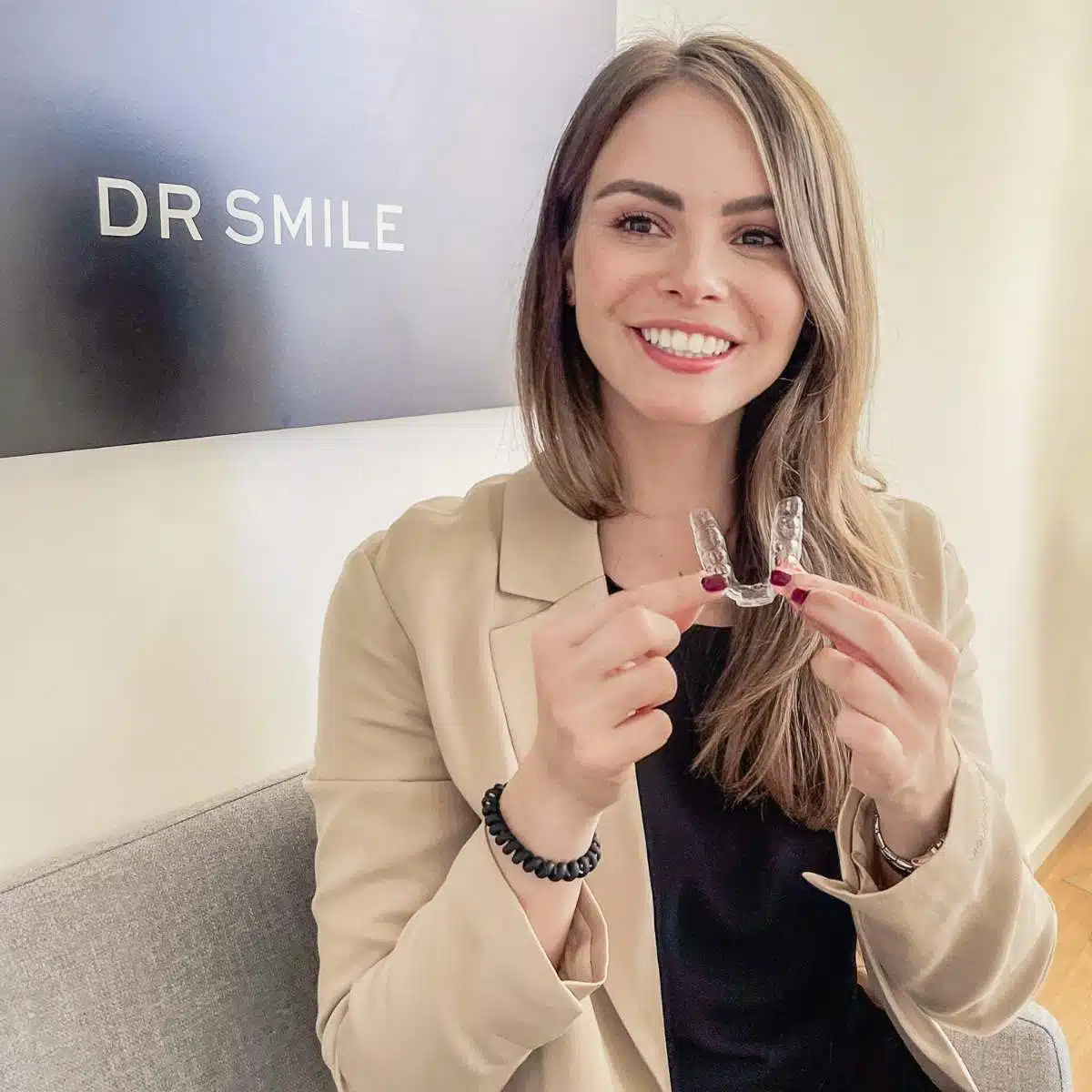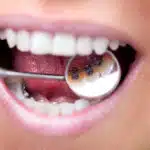Are you interested in supplementary dental insurance? Find out here what the insurance includes and what its advantages and disadvantages are.
Supplementary dental insurance can be a useful addition to statutory health insurance for many people.
While statutory health insurance only covers part of the costs of dental treatment, supplementary dental insurance can help to reduce the often considerable co-payments.
But before you take out supplementary dental insurance, it is important to understand the advantages and disadvantages, to know who this insurance is particularly important for and what you should look out for before taking out the policy.
In this article, you will learn everything you need to know about supplementary dental insurance.
| Get 150 € discount on your dental correction! |

Book a consultation appointment now at a nearby DrSmile partner practice and find out if teeth straightening with aligners is right for you.
The appointment is completely non-binding and does not involve any costs.
With the code “THATSMILE150” you will receive 150 € discount on the treatment.
What is supplementary dental insurance?
Supplementary dental insurance is a voluntary, private supplementary insurance policy that you can take out to reduce the costs of dental treatment that is not or only partially covered by statutory health insurance (SHI).
This includes services such as dentures (e.g. crowns, bridges, implants), prophylaxis, teeth cleaning and orthodontic treatment.
Advantages of supplementary dental insurance
1. reduction in own costs: The main advantage of supplementary dental insurance is the considerable reduction in own costs for expensive dental treatment. Depending on the tariff, the insurance can cover up to 100% of the costs that are not covered by statutory health insurance, especially for expensive dental prostheses such as implants or bridges.
2. cover for prophylaxis and dental cleaning: Many supplementary dental insurance policies also cover the costs of regular dental cleanings and prophylactic measures, which are often only covered to a limited extent by statutory health insurance. This can help to maintain your dental health in the long term and avoid expensive treatments.
3. better materials and treatments: With supplementary dental insurance, you can choose high-quality materials and state-of-the-art treatment methods that are often not covered by statutory health insurance. These include all-ceramic crowns, for example, which are more aesthetically pleasing and durable than standard solutions.
4. orthodontic benefits: Supplementary dental insurance can also be useful for children and adults who require orthodontic treatment. Statutory health insurance only covers part of the costs in certain cases, while supplementary dental insurance can offer additional benefits.

Disadvantages of supplementary dental insurance
1. costs: Supplementary dental insurance involves monthly premiums that vary depending on the scope of benefits and your individual risk profile. For healthy individuals with low dental needs, the cost of supplementary dental insurance can be disadvantageous in relation to the benefits covered.
2. waiting periods: Many supplementary dental insurance policies have a waiting period of several months to a year before you can claim certain benefits. This means that you often do not receive immediate insurance cover for existing or foreseeable treatments.
3. limited benefits: Not all supplementary dental insurance policies offer the same benefits. Some insurances have maximum limits for reimbursements or exclude certain treatments completely. It is important to check the policy terms and conditions carefully to ensure that the insurance meets your individual needs.
4. age-dependent premiums: Premiums for supplementary dental insurance can increase with age. This can be particularly expensive for older people, especially if they already have dental problems.
For whom is supplementary dental insurance particularly important?
Supplementary dental insurance can be particularly useful for different groups of people:
1. people with an increased risk of dental disease: If you have needed frequent dental treatment in the past or are at an increased risk of dental diseases such as tooth decay or periodontitis, supplementary dental insurance can help to reduce costs in the event of dentures or extensive treatment.
2. people who value high-quality tooth replacement solutions: If you value aesthetically pleasing and long-lasting tooth replacement solutions that go beyond what is covered by statutory health insurance, supplementary dental insurance can help you cover the costs of such treatments.
3. families with children: For children who may need orthodontic treatment, supplementary dental insurance can be useful to cushion the high costs that are not fully covered by statutory health insurance.
4. older people: The risk of tooth loss and the need for dentures increases with age. Taking out supplementary dental insurance at an early stage can help to control costs in old age, as the premiums for new policies are often significantly higher in old age.

What should you look out for when taking out supplementary dental insurance?
1. scope of benefits: Make sure that the scope of benefits of the insurance meets your individual needs. Check which treatments and materials are covered and whether there are maximum limits for reimbursements.
2. waiting times: Find out about the waiting periods that apply to certain benefits. These can vary and it is important to know when you can expect full insurance cover.
3. premium development: Pay attention to the premium development over time. Some insurance companies offer fixed premiums, while others have age-dependent tariffs that can increase significantly with age.
4. reimbursement limits: Many supplementary dental insurance policies have reimbursement limits, especially in the first few years of cover. Check these limits carefully to ensure that the insurance provides adequate cover when you need it.
5. customer ratings and test reports: Use independent test reports and customer reviews to get an overview of the reliability and service of the various providers. This can help you to make an informed decision.

Conclusion: Is supplementary dental insurance worthwhile?
Supplementary dental insurance can be a useful addition to statutory health insurance, especially if you value high-quality dental prostheses or have an increased risk of dental disease.
It helps to reduce the often considerable co-payments for dental treatments and offers you the opportunity to choose modern and aesthetic treatment methods.
However, it is important to weigh up the costs of the insurance in relation to the expected benefits and to check the terms of the contract carefully.
For some groups of people, especially younger and healthy people, the monthly premiums can be high compared to the actual benefits.
It is therefore worth comparing different offers and deciding individually whether supplementary dental insurance is the right choice for you.
| Get 150 € discount on your dental correction! |

Book a consultation appointment now at a nearby DrSmile partner practice and find out if teeth straightening with aligners is right for you.
The appointment is completely non-binding and does not involve any costs.
With the code “THATSMILE150” you will receive 150 € discount on the treatment.
FAQs on the topic of supplementary dental insurance
Here we answer a few of the most frequently asked questions about supplementary dental insurance.
What is supplementary dental insurance and why do I need it?
Supplementary dental insurance is a private insurance policy that covers additional costs for dental treatment that are not or only partially covered by statutory health insurance (SHI).
You need it to reduce the often high out-of-pocket costs for dentures, prophylaxis and other treatments and to gain access to high-quality materials and modern treatment methods.
What does supplementary dental insurance usually cover?
Supplementary dental insurance can cover various services, including dental prostheses (such as crowns, bridges and implants), dental cleanings, prophylaxis, fillings, root canal treatment and orthodontic measures.
The exact scope of benefits varies depending on the tariff and insurance provider, so it is important to check the details carefully before taking out insurance.
How much does supplementary dental insurance cost?
The cost of supplementary dental insurance depends on several factors, such as the scope of benefits, your age and your state of health.
On average, you can expect to pay monthly premiums of between 20 and 50 euros.
Plans with more comprehensive cover and a higher reimbursement rate are generally more expensive.
Are there waiting periods for supplementary dental insurance?
Yes, many supplementary dental insurance policies have waiting periods of several months to a year before you can claim certain benefits.
These waiting periods serve to prevent insurance policies from only being taken out for treatments that are already planned.
It is important to take this into account when choosing your insurance.
Does supplementary dental insurance cover the cost of implants?
Yes, many supplementary dental insurances cover the costs of dental implants, but to varying degrees.
Some plans cover up to 100% of the costs, while others only cover a portion.
Pay attention to whether there are reimbursement limits or restrictions for certain materials.
Can I take out supplementary dental insurance if I already have dentures?
If you already have dentures, it can be difficult to take out supplementary dental insurance that covers future repairs or replacement of these dentures.
Many insurance policies exclude existing damage or treatment.
However, there are special tariffs that also cover existing dentures, albeit often at higher premiums.
How do I find the best supplementary dental insurance for me?
To find the best supplementary dental insurance, you should compare the scope of benefits, waiting periods, reimbursement limits and monthly premiums.
Use independent comparison portals and read customer reviews to ensure that the insurance meets your needs.
Can the premiums for my supplementary dental insurance increase over time?
Yes, the premiums for many supplementary dental insurance policies can increase over time, especially if they are calculated according to age.
However, some tariffs also offer fixed premiums that remain stable over the entire term of the contract.
Find out in advance about premium trends to avoid unexpected cost increases.
What are the disadvantages of supplementary dental insurance?
The disadvantages of supplementary dental insurance include the monthly costs, waiting times and the possibility that certain treatments or materials may not be covered.
For some of you who rarely need dental treatment, the costs may outweigh the benefits.
It’s important to weigh up the individual benefits against the costs.
Is supplementary dental insurance worthwhile for me?
Whether supplementary dental insurance is worthwhile for you depends on your individual state of health, your dental needs and your budget.
If you frequently need dentures or value high-quality materials and regular prophylaxis, supplementary dental insurance can pay off.
However, if you rarely need dental treatment, you should carefully weigh up the costs and benefits.



Leave a Reply